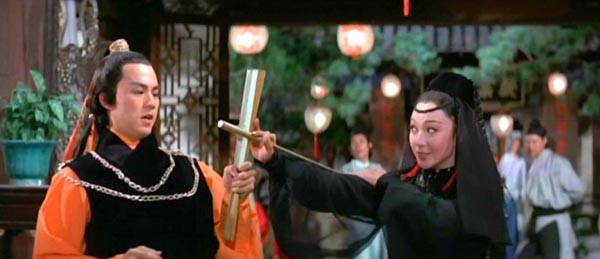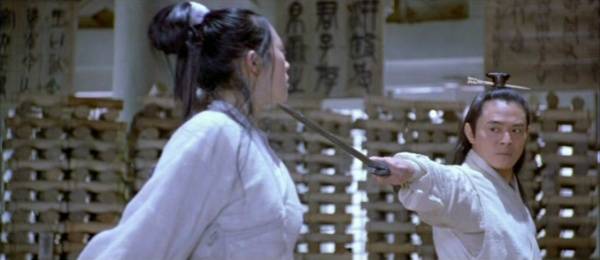| THE DIRECTORS SPECIALIZED IN WUXIAPIAN |
 HKCinemagic: A few filmmakers have made their own brand of wuxiapian. Let’s talk about them. HKCinemagic: A few filmmakers have made their own brand of wuxiapian. Let’s talk about them. |
Law Kar: We should not forget Chor Yuen’s films inspired by Gu Long’s novels. In fact Chor Yuen only made this kind of romantic wuxiapian, with a bit of suspense sometimes like a thriller and with pretty women and pretty boys. In fact, Gu Long’s martial arts novels incorporated a lot of gadgets, an details from James Bond films. He was very much influenced by that kind of things and put it into an ancient Chinese background. So in fact it was James Bond in the Chinese wonderland. There were a lot of beautiful girls. Sometimes some swordsmen disguised as pretty girls suddenly turned into men. There were a lot of intrigues too. And Chor Yuen adapted them into a genre that is quite unique. A blend of intrigues and romantic love stories.

James Bond in the Chinese wonderland.” Ti Lung and Li Ching in Chor Yuen’s Clans of Intrigue And then there are Chang Cheh’s and King Hu’s films. And Tsui Hark’s films. I think Tsui is the descendant of King Hu and has used his style to the extreme. If King Hu uses one flip, and one fight of five minutes in the bamboo forest, Tsui Hark would do it in 15 minutes with hundreds flips in the air, like in a manga. Both of them put a lot of consideration, a lot of energy on the figure on the image of the heroes; how they interact, how they move and how they use weapons. And they also consider the background and the setting to make it authentic. Tsui doesn’t make always the film look authentic, though, sometimes he doesn’t care if it is authentic or not. He follows his ways, he makes it pure and visual, so as to express his feelings. But still he aims at something higher than just [showing] heroism. He’s cultivated. He knows the historical context or the spiritual context of wuxiapian.
I think Zhang Yimou or Ang Lee, they tried martial arts films once or twice, but they are not yet masters or experts of this genre yet. [Ed.: Note that at the time we did the interview, Zhang hadn’t made Curse of the Golden Flower yet]. |
| |
 HKCinemagic: So do you consider Hero (2002) or House of Flying Daggers (2004) real wuxiapian? HKCinemagic: So do you consider Hero (2002) or House of Flying Daggers (2004) real wuxiapian? |
| Law Kar: These are wuxiapian, yes. But they are oddities from Zhang Yimou and maybe he will venture into that genre more. In my opinion, these are not [films] of his own, he didn’t create something special yet. He recycled things from Tsui Hark and from King Hu. And then he used Zhang Ziyi in a quite submissive fashion [general laughter]. Zhang Ziyi was raped by men several times in House Of Flying Daggers. Note that he keeps using Zhang Ziyi, tough. In the Western eyes, maybe characters need to attempt to sleep with Zhang Ziyi’s characters. |
| |
 HKCinemagic: So if there was not Zhang Ziyi, the movie wouldn’t be that interesting? HKCinemagic: So if there was not Zhang Ziyi, the movie wouldn’t be that interesting? |
| Law Kar: No, I think it wouldn’t. (Laughers)

Zhang Ziyi in Zhang Yimou’s House of Flying Daggers |
| |
| evolution of the wuxiapian genre |
 HKCinemagic: Back to wuxiapian, the genre has evolved with new technology and also following the audience taste. Even the heavy CGI-laden martial arts films can be called wuxiapian? HKCinemagic: Back to wuxiapian, the genre has evolved with new technology and also following the audience taste. Even the heavy CGI-laden martial arts films can be called wuxiapian? |
| Law Kar:
To me the essence of wuxiapian must be some kind of legend that happened in the past, in Ancient China. If it is a story in a contemporary context, it is not a wuxiapian. The setting that attracts us to wuxiapian is this kind of stories that happened many many years ago. At that time people could fly, they had something we cannot fully understand. Why people can fly in the air? Because it’s in the past. Maybe in the past, there were some people who could do that kind of things. So the setting is in the past. And then there are the costumes [and props] conferring the characters some kind of mythical quality. |
| |
 HKCinemagic: What is the situation now regarding that genre? HKCinemagic: What is the situation now regarding that genre? |
| Law Kar: Nowadays, such movies are harder and harder to produce in HK. So, after Tsui Hark’s films in early 1990s, and for more than ten years there were no more wuxiapian [Ed.: except maybe Storm Riders and The Blade]. Because they take a lot of money and time to make. Special effects, lots of costumes and settings cost millions and millions. Now, in HK we cannot afford that kind of productions. You have to do it in China, with HK-China co-productions, with Chinese capitals and for the China market or even export the films to other countries. And then you can make money. Nobody will make such films In HK only because of the risks. So the only wuxiapian made after Crouching Tiger Hidden Dragon (2001) [Ed.: a China-US co-production] are films made in China and marketed for the Chinese audience. Now Tsui Hark is set to make some new wuxiapian in China too [Seven Swords]. |
| |
 HKCinemagic: There is an exception, The Storm Riders (1998). HKCinemagic: There is an exception, The Storm Riders (1998). |
| Law Kar: The Storm Riders, maybe, yes. |
| |
 HKCinemagic: It’s the only example I think. HKCinemagic: It’s the only example I think. |
| Law Kar: This film had backers from China [Tian Shan Film Studio] and could be released in China. So they could spend a lot of money on this film. |
| |
 HKCinemagic: It was a big risk for the Golden Harvest to invest this kind of money on such a film. HKCinemagic: It was a big risk for the Golden Harvest to invest this kind of money on such a film. |
| Law Kar: Yes. So anyway, wuxiapian is not a trend anymore in the Chinese language communities I think, not a main trend anyway [Ed.: this in early 2005, things have change since then. The wuxiapian co-productions between China and HK have soared in quantity and quality]. Though some of them have become blockbusters, like The House of Flying Daggers or Hero and it happens maybe once or twice a year. |
| |
 HKCinemagic: Some Chinese friends told me they don’t recognize such films, they don’t like them. But foreigners love them. In the end, those films are made for foreigners no more for a Chinese audience, aren’t they? HKCinemagic: Some Chinese friends told me they don’t recognize such films, they don’t like them. But foreigners love them. In the end, those films are made for foreigners no more for a Chinese audience, aren’t they? |
| Law Kar: I think in the case of Zhang Yimou’s films, they are not only made for the foreign market but also for the Chinese market. In fact, these two films, Hero and House of Flying Daggers, were really popular in China, right? Not in Hong Kong, but very popular in China and also in Taiwan too. I don’t know why but there must be some wuxiapian made in China and occasionally they try to cater for the Chinese audience and also for the foreign audience. And maybe they can make two or three a year. But I would think, I would guess that it won’t be a trend like before, [there would be] just two or three films made a year in China. In HK, it’s even less. Sometimes not even one in HK (a year). Because we cannot afford big budget films anymore now. We have only low-budget films now in HK.

Zhang Ziyi and Jet Li in Zhang Yimou’s Hero
|
| |
| About the Hong Kong Film Archive (HKFA). |
| The HKFA (???????) is located at 50 Lei King Road, Sai Wan Ho, Hong Kong.
It was opened to the public in January 2001 after more than seven years of preparation.
The HKFA aims to acquire, conserve and catalogue Hong Kong films and related materials. It also provides film and related information, materials, facilities and enquiries services for film industry, interested parties and researchers. The HKFA organizes retrospectives, exhibitions, and seminars, and research and releases publications on the history of Hong Kong cinema.
The HKFA also edits books, such as the Hong Kong Filmography and Monographs of Hong Kong Film Veterans series.
Donation can be made following this link.
Source: The HKFA website
|
| |
